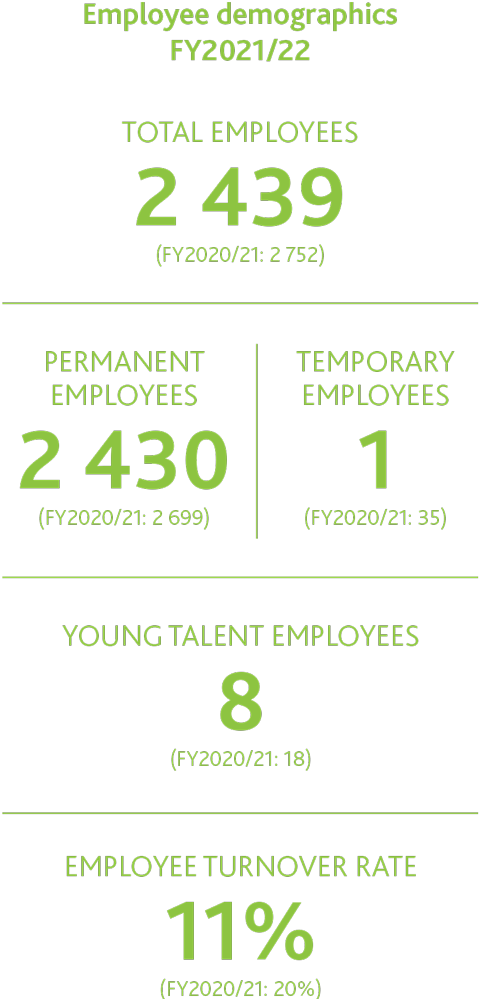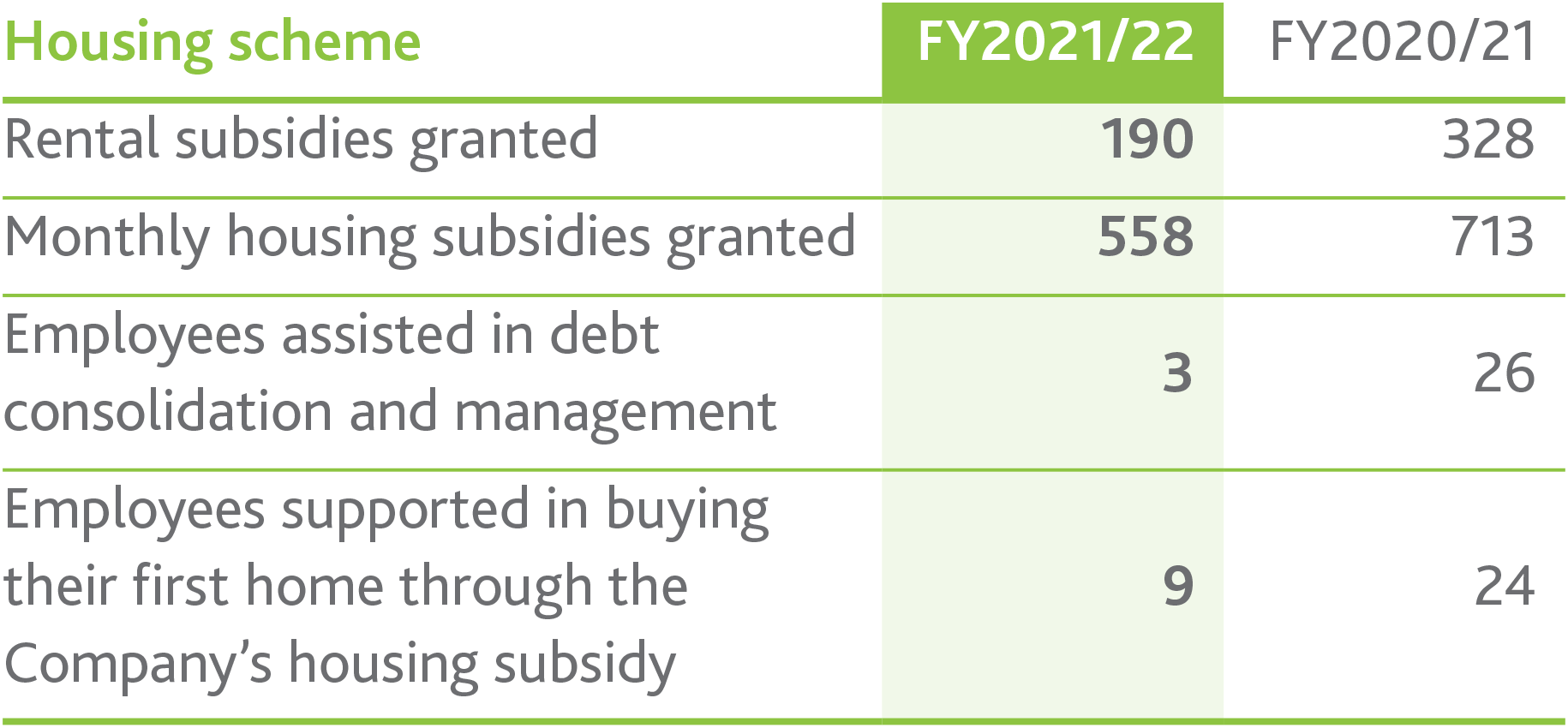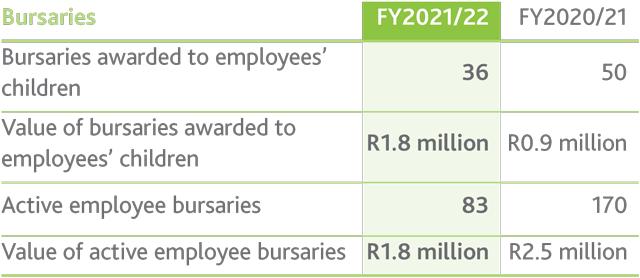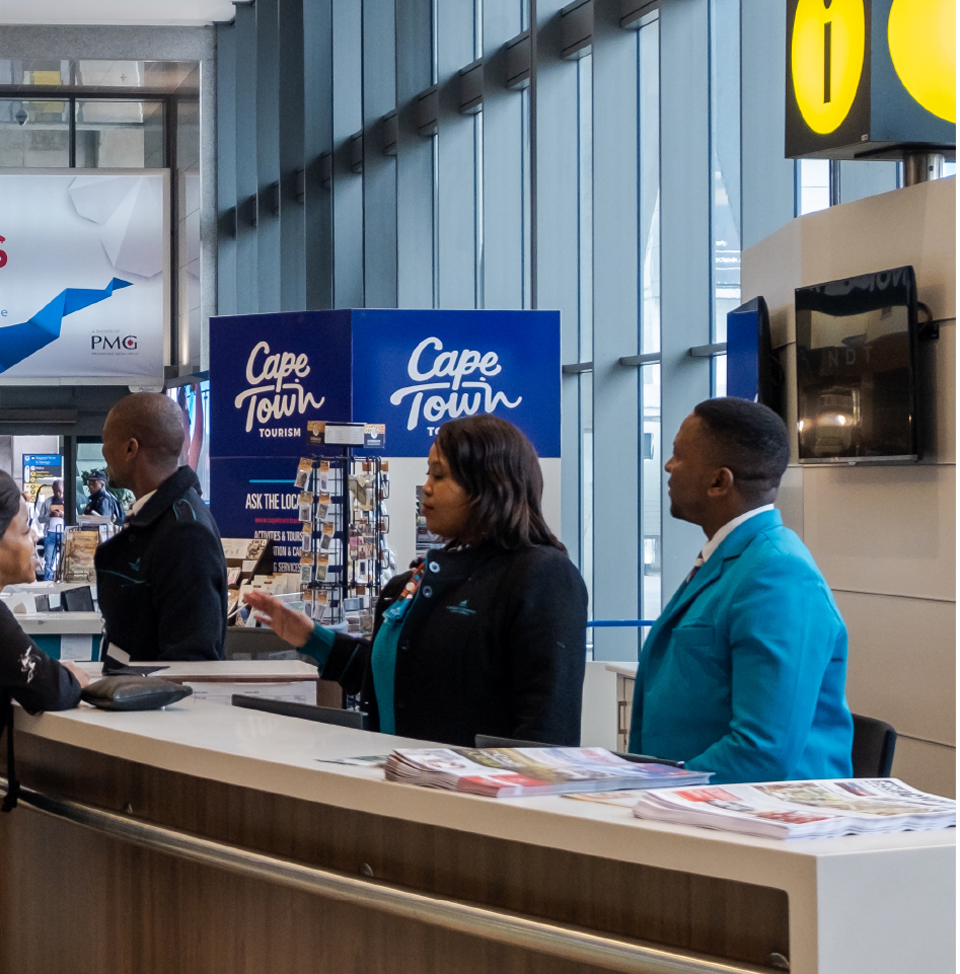BUSINESS ENABLEMENT
HUMAN CAPITAL
Overview
As in the previous period, we proactively monitored and managed the impact of COVID-19 on our employees throughout the year and continued to implement strategies designed to mitigate their risk of exposure to the virus.
All of our management and mitigation strategies are aligned to national strategies and policies as well as to the Occupational Health and Safety Act.
We also implemented a new Human Capital Strategy, which was developed in consultation with employee unions and representatives, and adopted a revised Governance Framework and Operation Model. This was necessary due to the impact of the pandemic on our operations and finances. The strategy, framework and operating model were all designed to facilitate the development of processes, capabilities and structures that will translate into a leaner and more agile organisation.
STAFF OPTIMISATION AND COST MANAGEMENT
Due to ongoing travel restrictions and limited revenue, we were faced with the challenge of having to realise savings of R200 million in staff costs during the year. The first step was to reduce our leave liability by R50 million per annum, and special thanks are due to our employees, who were understanding and supportive of the need to do this. An additional saving of R31 million was realised by not replacing employees who resigned in the normal course of business and a further saving of R54 million was realised by not granted salary increases for the second period in a row.
The voluntary separation package (VSP) programme introduced in 2020 was extended and ran from 1 December 2021 to 31 January 2022, realising a saving of R68 million and, finally, re-aligning overtime work required on Sundays realised a saving of R4 million.
Non-statutory payments and stand-by allowances continued to be paid at the reduced rates introduced in 2020 and new uptake of the housing scheme and the staff bursary scheme remained suspended. The freeze on recruitment remained in place except for filling positions critical to business continuity and sustainability. Wherever possible, we recruit internally to fill critical positions.
In line with our Sustain and Recovery Strategy, we continued to work on optimising the utilisation of our remaining staff. As part of this process, it was essential to take stock of the capabilities and organisational capacity lost due to the uptake of VSPs. A process of succession management was therefore undertaken, starting at Executive Committee level. This will be cascaded down through our management and staff structures during the course of the current year. The focus of this process is to consolidate the capabilities we have and to build capability where capability risks have been identified.
Staff costs accounted for 39% or R1.3 billion of the total operational expenditure budget of R3.3 billion in for the reporting period.
Communications with staff continued to be consistent throughout the year and the human resource management working teams put into place in 2020 remained in place. The data analysis dashboard – also initiated in 2020 – was used to support all engagement with staff.

EMPLOYEE SATISFACTION AND VALUE PROPOSITION
As in the previous period, initiatives to measure employee satisfaction and improve our employee value proposition remained on hold. We did not conduct an employee satisfaction survey as pandemic-related people management initiatives were prioritised. We were nevertheless the recipient of the ACI HR Excellence Award for 2021, which is testimony to the values-driven approach we adhere to in the management of our people despite practical and financial constraints.
The formal adoption of a hybrid working model has been well received as it has given employees flexibility that they did not previously have. As we have been unable to offer increases for the past two periods and as fuel costs continue to increase dramatically, the adoption of this model has proven to be not only beneficial to employees, but also to be a great equaliser. This model of working will therefore remain as a permanent feature of our people management processes.
TRAINING AND DEVELOPMENT
Employees participating in development programmes prior to the advent of the pandemic were able to complete their courses during the reporting period and we continued to meet our obligations to existing bursary recipients.
Within the framework of our Recover and Sustain Strategy, the Training Academy is critical to our ability to upscale non-aeronautical revenue. We have therefore devoted a great deal of time and attention to forming partnerships with education and training providers and to building up internal capacity.
TRANSFORMATION
In terms of business transformation, we used our updated Governance Framework and Operating Model as a framework for re-thinking our ways of working, which was necessary to secure sustainability in both the short- and the long-term.
We therefore undertook an extensive review of processes across all divisions to ensure that similar functions were grouped together and to eliminate overlaps. From a capability perspective, this meant that certain functions needed to be handed over and, where there were duplications, those had to be removed. This has resulted in organisational structures that are much leaner and flatter.
Newly implemented optimisation procedures also gave us the flexibility to deploy resources where there were serious constraints by, for example, insourcing certain functions that had previously been outsourced. This gave us the flexibility we needed to maintain customer service standards and security mandates as COVID-19 alert levels changed.
Remuneration and performance management
Refer to our Governance and Remuneration Report for a full account of our remuneration and performance management during the reporting period.
EMPLOYEE ENGAGEMENT AND WELLNESS
Despite budget constraints, we continued to actively engage with our employees and to support their well-being through various initiatives.

HOUSING SCHEME
The housing scheme aims to help employees to purchase a home and to improve their quality of life and personal security. In terms of our revised Financial Plan, all new applications for rental renewals, bond subsidies, upfront deposit subsidies and debt consolidation were put on hold effective 1 August 2020. Employees who were beneficiaries of this scheme prior to the advent of COVID-19 did, however, continue to benefit from it. They make up 70% of the total employee target population for this benefit.
The employee transport scheme that was introduced in 2020 proved to be challenging to manage and, during the course of the reporting period, we opted for providing a trave allowance instead. This is designed to ease travel difficulties for our employees, particularly those in operations that work shifts.

BURSARY SCHEME
Airports Company South Africa offers the children of employees in Grades A to C bursary support to pursue studies in disciplines identified in the South African National Scarce Skills list. The programme also offers workplace exposure through vacation work, providing learners with practical work exposure and, ultimately, with permanent employment where opportunities exist. During the reporting period, 119 bursaries were awarded to the value of R3.6 million.

TRADE UNION REPRESENTATION AND ENGAGEMENT
Since the advent of COVID-19, we have worked closely with representative unions, including the National Education, Health and Allied Workers’ Union (NEHAWU), which represents 33% of our employees, and the National Union of Metalworkers of South Africa (NUMSA), which represents 22% of our employees, in order to manage the impact of the pandemic on our staff.
Both unions have been engaged and supportive partners throughout the past two years and we commend them for their collaboration at such a challenging time in the history of our business.
OUTLOOK
The realignment of our business in response to the pandemic has ensured that we have been able to remain functional and sustainable in the face of a drastic decrease in revenue over the past two periods. Within the context of a more streamlined and agile operating structure, we remain committed to the wellbeing of our staff and other stakeholders and we continue to actively engage with them in order to fulfil this commitment.
We will continue to operate according to our Recover and Sustain Strategy and associated strategies and plans during the current period and will re-focus on growth and development once revenue permits.







